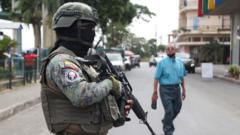The deployment of 800 National Guard troops in Washington DC by President Trump aims to address perceived crime and homelessness issues. While Trump claims the city is plagued by lawlessness, Mayor Muriel Bowser argues crime rates have actually decreased. The National Guard’s presence has stirred protests and concerns over federal control.
Trump Mobilizes National Guard for Crime Crackdown in Washington DC

Trump Mobilizes National Guard for Crime Crackdown in Washington DC
President Trump's recent decision to deploy National Guard troops in Washington DC raises debates over crime rates and homelessness in the capital.
In a decisive move, President Donald Trump has deployed 800 National Guard troops to Washington DC, taking control of the city's police force in a bid to crack down on crime and homelessness. Declaring a “public safety emergency,” Trump emphasized the need for action, stating, "It's becoming a situation of complete and total lawlessness," during a press conference at the White House. This deployment supplements federal law enforcement already present in the city.
Mayor Muriel Bowser has fiercely rejected Trump's characterization of crime in the capital, highlighting that while there was a surge in 2023, current statistics indicate a significant decline since then, and violent crime is at a 30-year low. Bowser noted, “We are not experiencing a crime spike,” countering Trump's assertions with a claim that the president is well aware of the city’s ongoing efforts to combat crime.
In an assertive declaration, Trump claimed, "This is liberation day in DC, and we're going to take our capital back," stating that Washington had been overtaken by criminal elements. His administration announced that U.S. Attorney General Pam Bondi would oversee local law enforcement while the city remains under federal control.
Significantly, Trump invoked the District of Columbia Home Rule Act, which permits the president to manage the police force during an emergency. Although the act outlines strict conditions for its application, Bowser contends those conditions are not present in the city. She expressed concern about the implications of National Guard troops enforcing local laws.
Trump's actions extend beyond crime; he also addressed homelessness in Washington, stating, “We're getting rid of the slums," without providing specifics. Local advocacy groups countered that homelessness had decreased by nearly 20% for individuals over the last five years, criticizing Trump's strategies as merely shifting the issue elsewhere.
Meanwhile, outside the White House, demonstrators rallied against Trump's maneuvers, chanting slogans emphasizing local governance. Protesters accused the president of seeking control rather than prioritizing safety.
In past weeks, Trump has criticized Washington’s Democratic leadership via social media, notably following an attack on a former government employee. At Monday's conference, he labeled the violence in the city a "threat to America."
This deployment marks the National Guard’s first return under Trump since its use during the Capitol riots in 2021 and follows his earlier orders to deploy troops during civil unrest in Los Angeles.
Mayor Muriel Bowser has fiercely rejected Trump's characterization of crime in the capital, highlighting that while there was a surge in 2023, current statistics indicate a significant decline since then, and violent crime is at a 30-year low. Bowser noted, “We are not experiencing a crime spike,” countering Trump's assertions with a claim that the president is well aware of the city’s ongoing efforts to combat crime.
In an assertive declaration, Trump claimed, "This is liberation day in DC, and we're going to take our capital back," stating that Washington had been overtaken by criminal elements. His administration announced that U.S. Attorney General Pam Bondi would oversee local law enforcement while the city remains under federal control.
Significantly, Trump invoked the District of Columbia Home Rule Act, which permits the president to manage the police force during an emergency. Although the act outlines strict conditions for its application, Bowser contends those conditions are not present in the city. She expressed concern about the implications of National Guard troops enforcing local laws.
Trump's actions extend beyond crime; he also addressed homelessness in Washington, stating, “We're getting rid of the slums," without providing specifics. Local advocacy groups countered that homelessness had decreased by nearly 20% for individuals over the last five years, criticizing Trump's strategies as merely shifting the issue elsewhere.
Meanwhile, outside the White House, demonstrators rallied against Trump's maneuvers, chanting slogans emphasizing local governance. Protesters accused the president of seeking control rather than prioritizing safety.
In past weeks, Trump has criticized Washington’s Democratic leadership via social media, notably following an attack on a former government employee. At Monday's conference, he labeled the violence in the city a "threat to America."
This deployment marks the National Guard’s first return under Trump since its use during the Capitol riots in 2021 and follows his earlier orders to deploy troops during civil unrest in Los Angeles.



















